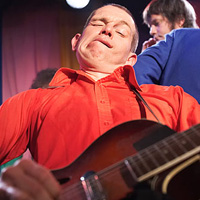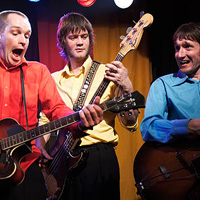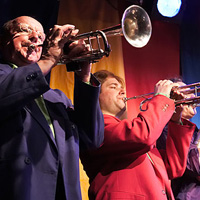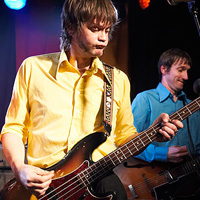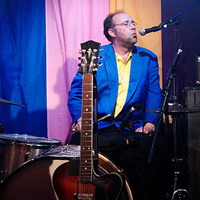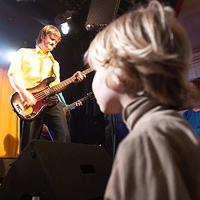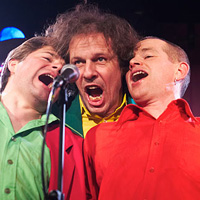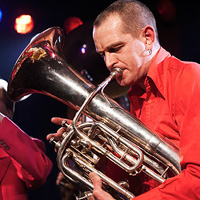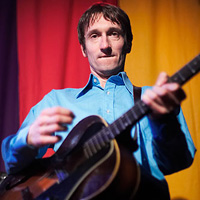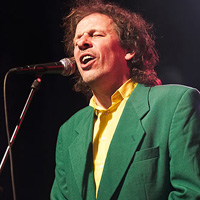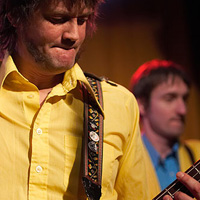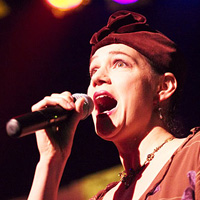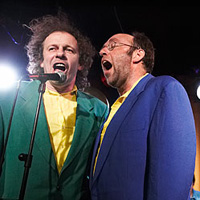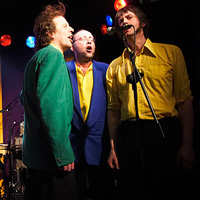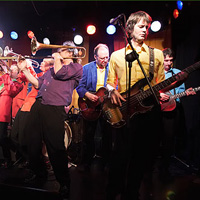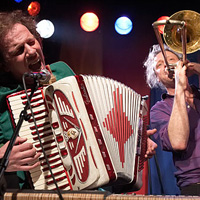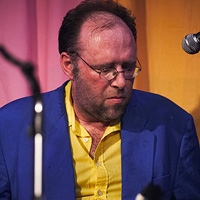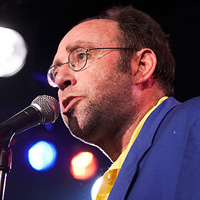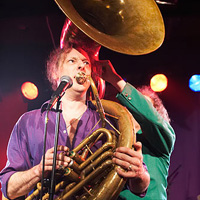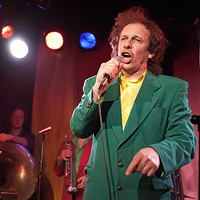Dutch squatter's movement and the punk waves
De Kift, started in 1988, combines its self-willed music of pots and pans, brass band tooters, gnarly, scraping choral singing with lyrics from literature.
Around 1988 De Kift emerged from the Dutch squatter's movement and the punk waves of the late 70's, early 80's. Think Wire, Crass and the Minutemen. Described as something like art-folk-punkers De Kift arrived to the forefront of Holland's fringe-political, musical and theatrical movements. In Holland De Kift have become legends influencing a whole generation of Dutch musicians with their combination of punk angst, world literature and the Crescendo Music of their home village where Jan, the father and oldest member of De Kift, has been a member for over 53 years. De Kift's initial goal was to make music using text in their own language with an accent on intelligibility. This idea emerged as rhythmic music in an electric arrangement on the 1989 vinyl lp "Yverzucht".
In 1992/1993 De Kift members lent their assistance as actors and musicians to the Mal film "Eddie Brains" which has been described as an absurd detective thriller where the soundtrack was played live.
After Maarten Oudshoorn (vocals/lyrics) left, De Kift began borrowing their texts from literature. Works by Wolfgang Borchert, E.M. Remarque and Jan Arends formed the basis for their 1993 cd release "Krankenhaus". This record gives an impression of how pop music in the Netherlands might have sounded without the interference of WWII and rock 'n' roll. Here De Kift combines the best of brass band music and punk rock. Ferry has formed a collective centered around the old line-up of the band with his father Jan Heijne on the trumpet, the poet Eddie Kagie, multi-instrumentalist and vocalist Frank van de Bos and-BGK bassist Mathijs Houwink. "Krankenhaus", originally package in a small wooden box with burned cover art, is a collection of compressed short stories about madness and war written from a sick-bed.
Between 1993 and 1996 De Kift continued touring through the Netherlands, Germany and France. "Krankenhaus" was released in the German language and Jos (the Ex) is guest vocalist during the German tour. With time and experience the group realized that the theatrical character of Kift music required costumes and decor. This led to the 1996 cd release "Gaaphonger" a theatre piece based on the adventures of the Dutch explorer Willem Barentsz during his explorations of Nova Zembla, an archipelago in the Arctic Ocean in the north of Russia and the extreme northeast of Europe, circa 1596. Imagine ship-crunching ice fields, the building of a cabin with salvaged wood from his ship, 'the Jacob van Heemskerck,' and the strenuous fight for survival during the months-long winter nights. These barren influences and the state of mind of an isolated group are central to the music of "Gaaphonger".
Amidst the "Gaaphonger" youth concerts the "Morrelbarrel" tour suddenly occurred. In 1998 De Kift, under the guise of a slick rock machine sponsored by a dubious automobile company, created a new body of work entitled "Vlaskoorts". This new work focused on a profound contact between the band and its audience. "Vlaskoorts" is the story of a completely collapsed country family. Fragments of text were used from: Venedikt Jerofejev, Jan Arends, Wolfgang Borchert, Flannery O'Connor and Werner Schwab. In 2000 a film of the story was made in cooperation with film makers André van der Hout, Karen Mulder and Matte Mourik. The film is called 'De IJzeren Hond' (The Iron Hound) and the results are a combination of film, music and live theatre. Vlaskoorts is a complaint which afflicted many flax workers. A condition of light delirium, whereby one's performance became unreliable. Sometimes there was even talk of straight hallucinations. The phenomenon was caused by a bacteria that separated the long flax fibers from the surrounding plant tissue. The flax was soaked for some days in warm water and fatty acid bacteria. From this 'retting', many flax workers got fever that was treated, as a rule, with an old and trustworthy medicine: Holland's gin...
In 2001 De Kift celebrated its 12½-year anniversary. This memorable event was highlighted with the presentation of the special anniversary cd, "Koper" (Copper). Koper presented a review of the musical history of the "Zaanstreek" era De Kift (area around Zaandam, N. Holland). This mile marker record incorporated a kind of new anthology of stylized quotes celebrating their four previous albums and history to date. A greatest hits but not. "Koper" combined new compositions with several adaptations from the "De Molenaar" (the Miller) project (2000) and previously unreleased material. De Kift plays itself at its own jubilee ball and for a small black fee; they have come up with a master of ceremonies who guides the audience through this Super 8-in-the-flesh extravaganza: "Pardon me? Yes, there are even white mushrooms. We got it all. You won't believe all the food that's being dished up tonight. The door knobs have been polished, the waiter's wearing the latest fashion in ties, and there's a chubby doorman at the entrance. Would you believe it? No expenses have been spared to celebrate our guest of honor's reputation! Here, give the MC another round, would you? Let's party, folks. Hey, you musicians, let's hear another march!" At the end of 2001 Marc Stakenburg and Sjoerd Vos made the documentary film "Iets wat niet glimt kan ook mooi zijn" (Things that do not shine can be beautiful too) about De Kift. It was broadcasted by KRO television and RTV Noord-Holland and shown at the Crossing Border festival. Then in 2002 the group was awarded a Silver Harp, an industry prize for promising newcomers. In January 2003 the film "De Arm Van Jezus" (The Arm of Jesus) directed by André van der Hout, opened at the International Film Festival in Rotterdam and De Kift was responsible for the score as well as filling most of the cast. The film was nominated for a Tiger Award and at the Netherlands Film Festival was awarded the Dutch film critics award.
The cd "Vier Voor Vier" (Four by Four) appeared in 2003 as an opera based on the play "Elizaveta Bam" (1928) by the Russian author Daniil Kharms. The record combines De Kift's self-willed music of pots and pans, brass band tooters and gnarly, scraping choral singing with the classically trained singing voices of Jeroen Manders and Mariecke van der Linden. With "Vier Voor Vier" De Kift brought together the worlds of opera and pop music. At the beginning of 2005 the group presented "De Kift", the first CD aimed especially at a French audience. Its presentation took place in Paris with tracks from "Koper" and "Vlaskoorts". This same cd went on to become De Kift's first ever North American release in 2006 with its reissue by North East Indie Records.
De Kift remains fully active with two generations on stage. They continue to tour throughout the European continent and even through parts of the farther east including Russia. The group's creativity is relentless and they remain yet to be discovered in the sense of their importance to the contemporary musical/lyrical/political/theatrical traditions. They are unparalled in their country and internationally.
